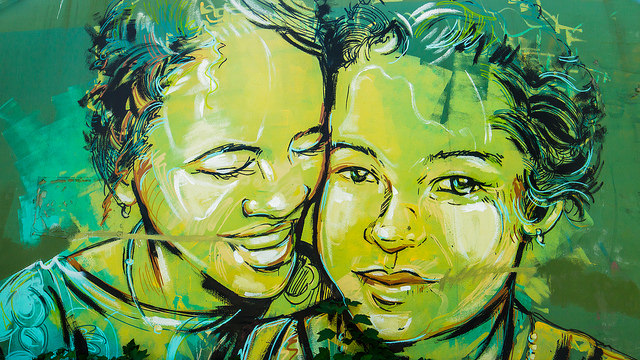
Author’s note: When I wrote these pieces, I did not do the self-education that I needed to about some very problematic social justice issues in a pervasive culture of self-care. In the pieces I’ve written, I was not aware of how problematic and dangerous that white, privileged ideologies can be; and ally-ship includes taking responsibility for my role in the perpetuation of oppression, disentangling the toxicity of oppressive notions (especially in regards to healing), and bringing awareness to other white people to call out emotionally- and spiritually-bypassing culture
I wrote these articles with highly individualistic language, and cannot remove them according to Elephant Journal policy—but I hope that whoever decides to read them that has suffered from any marginalization or systemic oppression knows that I am committed to shifting rhetoric within my communities and am now involved in social organizing groups working towards a more rehabilitative and transformative culture.
~
There are people in our lives who, when we think about them, bring up a sudden flash of heat that rises up into our faces, swells our eyes with saltwater, and suddenly make it feel like a cinderblock was dropped into our stomachs.
The ones we’ve cried with, laughed with, fought with, and held. The ones we love the most. The ones who tell us that we’ve changed.The ones who we think have changed. The ones we may feel like we have lost.
We repress our stories of this love because, oftentimes, it’s too painful to feel them.
I wonder what would happen if we were to stop repressing—and start feeling.
I wonder who might feel like they weren’t alone if we started sharing.
So here I am, tears falling on the keys I’m pressing, sharing a story about love—and that the way that it changes.
I grew up the youngest. I was loved. Hard.
Born nearly a decade later, my older siblings treated me like the most delicate piece of china behind the glass. Whenever I was taken out, I’d be held in hands of glue, guaranteed not to be dropped, hurt, broken, chipped, or judged, no matter what designs or contents I was made of. I was malleable.
This is the way I was loved as a young girl.
As we grow older, our substance begins to change. It hardens. Our lines become more defined. We find that those looking at our shapes and designs behind the glass start to make judgements about what they see, and as our eyes set in, so do we.
Some of us mold and settle with hard, fine, organized lines, and some of us settle in with chaotic, unpredictable patterns.
So when we grow into our designs and shapes, and the hands we use to hold each other start holding others too, it starts to feel like our composition is disintegrating. And we try to pick up the pieces in phone calls, text messages, emails, and memories.
For fleeting moments, it might feel like the glue is holding us together again, back in our designated spaces, softened and free, but we soon learn that we don’t have the power to magically congeal.
We do not have the power to turn back time and become the simpler versions of who we once were, when our designs and patterns hadn’t been formulated. We can try, but it doesn’t last.
So if you’ve ever had an older sister, you’ll understand why disintegration might happen as you both grow. You start out without the concept of “self.” Or at least, you convince yourself you’ll fill her shoes, and then they will be your shoes, and so her shoes are your shoes. One. You know what I mean? All you want to do is be her.
The sister relationship is one of the strangest connections there is. It is more intimate than any romantic relationship you’ll ever have, which makes no sense. It breaks boundaries of love and rules of the household. It’s the true experience of not knowing where you end, and another begins.
She’ll share her love stories with you about her most intimate experiences before you can even understand what they mean. You’ll stare in awe at how strong she is, hoping one day you’ll look as beautiful when you cry, or that you’ll even have it in you to feel that much over loving another.
You’ll write something like this, and then understand that you do.
She’ll ask you to sit on the floor of the bathroom while she showers so she can share with you every stitch in the fabric of her mind. She’ll ask you to take naps in the same room that she studies in so that you can be near. She’ll be 24 and still beg you to sleep in her bed every night, and then when you’re laying next to her, she’ll ask you to play with her hair until she falls asleep.
You’ll be so eager to play with her hair. You’ll pretend like you’re annoyed, but you’ll actually feel so much pride. Your superhero also makes herself vulnerable to you—you look up to this person (who can do anything) for years, and yet she chooses you to share everything with.
She’s your biggest fan, and you didn’t even do anything to earn it. You simply came into existence.
It is the most open, revered, honest, and raw connection you’ll ever experience with another human being, because you never knew that you were any different, until the passing of time.
And then there’s your older brother—the greatest protector you’ll ever have—next to your father.
You’ll stay up for days at a time watching mystery television series and sharing secrets, ice creams, and cuddles. He’ll chase you around the house playing tag and screaming profanities in the middle of random sentences that make no sense.
My brother is a walking representation of collectivism—he used to pick up homeless people and drive them hours across the state of Florida and miss dinner. He knew he’d get grounded for it, and didn’t have the money to pay for the gas, but he’d do it anyway, sometimes multiple times a month.
I don’t know if my parents knew whether to laugh and reward, or cry and punish. My brother wouldn’t know how to put himself first even if you gave him the guidebook.
So whenever I was sent into my room for time-out as a young girl, which at a blurry point in time morphed into grounding, and then into car-key forfeiture (does anyone remember how these transitioned into the other?) my brother would spend hours begging my mom to let me be free, even if I was in trouble because I’d done something to hurt his feelings. Really though—who does that?
She’d walk with him into my room and say, “I can’t take it anymore. He won’t stop. You’re lucky he’s got a way with words and loves you so much.” And if my mother wouldn’t let up, he’d sneak into my room and talk to me while I served my time.
Yet another sibling whom I idolized, and for some unspoken reason, worshipped me.
And without looking, years would go by, and I’d slowly feel a cinderblock get lodged into my stomach. We left for college, got stressed with our personal lives, and started building walls so big you’d think they were created as compensation. We found lovers who we confided in, married, or who broke our hearts so badly, we closed up. We became second in line to hear each other’s news. Our paths diverged as our interests settled in, with the song sharing, movie recommendations, and video chats left miles behind us.
Bed-sharing morphed into meal-sharing. Cuddling morphed into movies on opposite sides of the couch. Secrets morphed into congenial conversation. Excitement morphed into obligation. And the hardest thing a person will ever have to swallow—truth morphed into formality.
When we feel this, is when our eyes well up with tears. It’s one of the deepest pains there is.
And as I observe these new fuzzy points in time, when everything changed while it felt like nothing had at all, I begin to understand a fundamental truth about life. Love changes form as the people who share it change.
This is true for every relationship there is. There is no special formula for keeping love the same.
To do that would mean trying to morph into the people we were then to keep that particular type of connection alive, and it isn’t honest. To create what we had then would mean giving up the people we are now. We’d be erasing all of our new patterns and shapes and asking that they do the same. Removing all of our contents until we were empty.
It would be forced, inauthentic, and unrewarding. It wouldn’t be glue. It would be tape, and it would keep falling apart over time, becoming less and less adhesive. Have you ever tried to take on your old roles? It feels icky and wrong.
To get that connection back would also mean requiring that the other person gives up who they’ve become—the life they’ve created, the loves they’ve found, and the worlds they’ve built. Does the idea of that not hurt more than the feeling of loss itself?
We might yearn for what we had, but not who we were when we had it. And there’s a strong possibility we wouldn’t be who we are now if things were still the same.
And so we have choices. The first: We we can choose to appreciate the way things were and accept the way things are. The second: We can slap a bunch of duct tape on each other and pretend that it doesn’t show, or the third: We can reject it all and disintegrate in the process.
We have a choice, until we realize that we don’t have a choice. Only the first choice works. The one that brings all the heat and the tears and the pain, but also the strength, and the love, and the glue. How catastrophically ironic.
The world is funny. As young children, we’re given love with no conditions. Our designs, and shapes, and contents, held no value. And then we learn that they do. We grow, and our interiors and exteriors change, and the love we shared can feel like it changes with us. Our paths diverge and we aren’t malleable anymore. We’ve grown into our own, yet yearn for what we had.
I can’t help but feel as if life is a major lesson in love, bringing it all full circle—teaching us to give love now in the same way we were given love in the beginning. To accept the shapes and patterns that we are, that others are, and to never spill out any of our contents or expect anyone else to, in the hopes of restoring the past.
We still have the love. It’s just taken on a different form.
What’s more, it’s a lesson in learning how to have hands full of enough glue to carry whoever is ready to land in them, even the ones we thought we’d lost.
~
Author: Gabrielle Dominique
Image: flickr/vegarshansen
Editor: Lieselle Davidson











Read 0 comments and reply